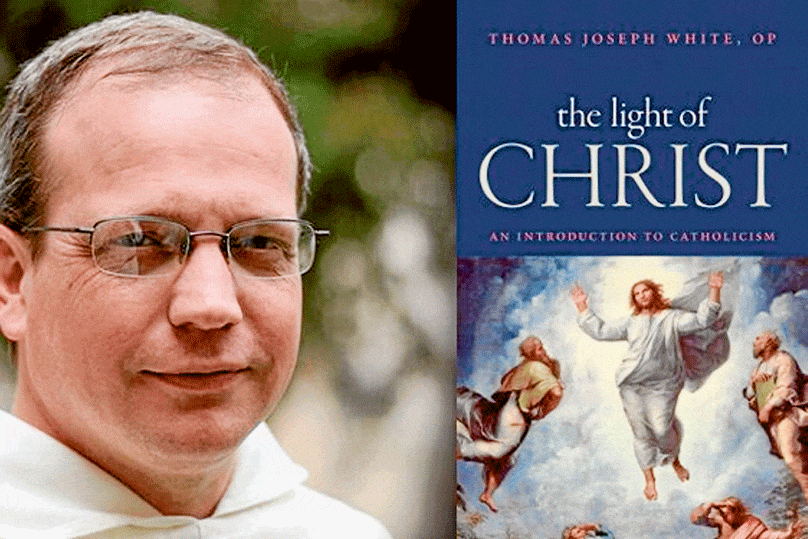 In age where religion is often equated with superstition and Christianity is seen as an obstacle to human rationalistic progress, it is difficult to be a believing Catholic. Faith is hard today, especially when, as inevitably happens, we go through periods where there is little emotional or spiritual consolation.
In age where religion is often equated with superstition and Christianity is seen as an obstacle to human rationalistic progress, it is difficult to be a believing Catholic. Faith is hard today, especially when, as inevitably happens, we go through periods where there is little emotional or spiritual consolation.
Lord I believe, help my unbelief! How can I believe when the elite, the media, colleagues, even perhaps family and friends all think that my beliefs are borderline crazy? Surely, when there are so many non-believers, they can’t be wrong.
Stepping in to help in this situation is a superb introduction to the breadth and depth of the Catholic faith, Thomas Joseph White’s The Light of Christ: An Introduction to Catholicism (CUA, 2017).
White is an Associate Professor of Theology at the Dominican House of Studies in Washington D.C. and is considered one of the best young Catholic theologians in the English speaking world.
Archbishop Charles Chaput has compared the work with Joseph Ratzinger’s Introduction to Christianity (1969). This is high praise indeed and, although they are very different books in terms of style and influence, the praise is merited.
When he wrote his Introduction to Christianity, Joseph Ratzinger was speaking to a University audience caught up in a revolution where freedom from restraint was idolised and Marxism was seen as the only ideology to ensure human progress.
He was also speaking to a Church living in the uncertainty and hope of the aftermath of the Second Vatican Council.
White’s Introduction is written in the context of a post-truth world, sceptical of any claims of reason, especially on our moral lives. His book demonstrates how reasonable the claims of Catholicism are, that it appeals equally to the mind and to the heart.
Although Thomas Aquinas is the chief influences of the work, White successfully blends the greatest and most saintly minds of the tradition to draw out the intellectual richness of the Catholic faith.
Irenaeus, Tertullian, Gregory of Nazianzus, Augustine, Boethius, Catherine of Siena, Bonaventure, Francis de Sales, Pascal, John Henry Newman, Balthasar, Ratzinger and many others all form part of the rich theological tapestry that White weaves.
However, this book is not just a mere synthesis as White draws everything together in his own clear style that encourages in the reader a sense of wonder. A particular emphasis of the book is the intrinsic relation between faith and reason. However, this relationship is complex, writes White, “because revelation (the divine ‘unveiling’) clashes with human convention. Christian revelation is not opposed to reason. It surpasses reason. But it contradicts conventional ideologies.”
White stresses that from its beginning Christian thinkers saw Greek philosophy as a powerful ally. It is part of Catholic Teaching that philosophy, the use of our natural reason, can arrive at truths concerning the existence and nature of God.
At the first Vatican Council (1869-70) the Church declared that “God, the source and end of all things, can be known with certainty from the consideration of created things, by the natural power of human reason: ever since the creation of the world, his invisible nature has been clearly perceived in the things that have been made.” However, the relationship with Greek philosophy was always subordinate to the radical Christian claim that God had become in-fleshed and dwelt amongst us. That the transcendent God could become so immanent to his creation was anathema to the Greeks. Thus revelation builds upon and surpasses reason.
The study of theology begins with wonder. Wonder leads to questions, which are desirous of answers.
This is the mode for theological study because the questions asked are in many senses never really answered. There is an understanding that the theologian’s task is never finished, never accomplished.
At the outset of the book White presents the work as a companion, especially to those who are seeking answers to ultimate questions.
His goal is to make explicit “in a few broad strokes the shape of Catholicism.” The faith is an intelligible mystery, visible and invisible, ancient and contemporary, mystical and reasonable. White succeeds in his goal and he also achieves what good theology should always do, drawing the reader deeper into the mystery and increasing a desire to pray. In knowing Him more we want to love Him more.
St Thomas Aquinas states that John’s Gospel reaches to such theological heights because the disciple whom Jesus loved was its author.
Aquinas writes: “The true sign of friendship is that a friend reveals the secrets of his heart to his friends.” In this essential book White demonstrates that he is a true friend of Jesus, a friend who has heard the secrets of the Lord’s heart and wants to share them with the world.
